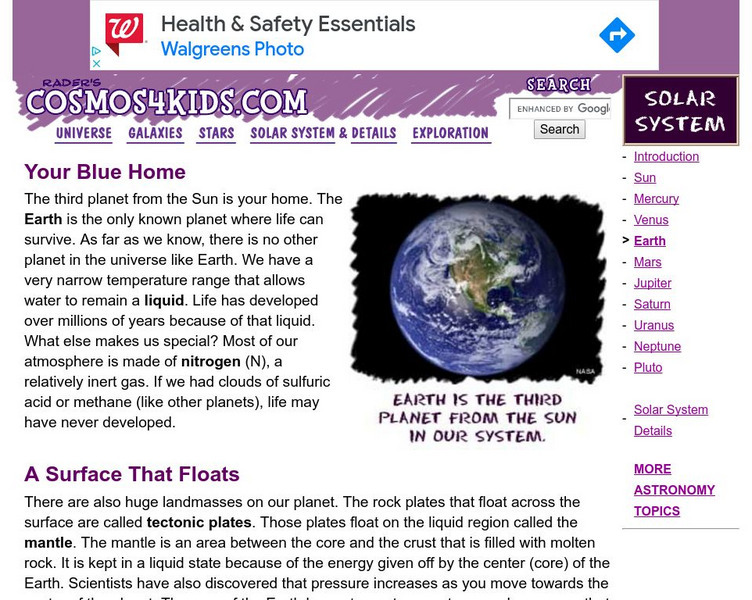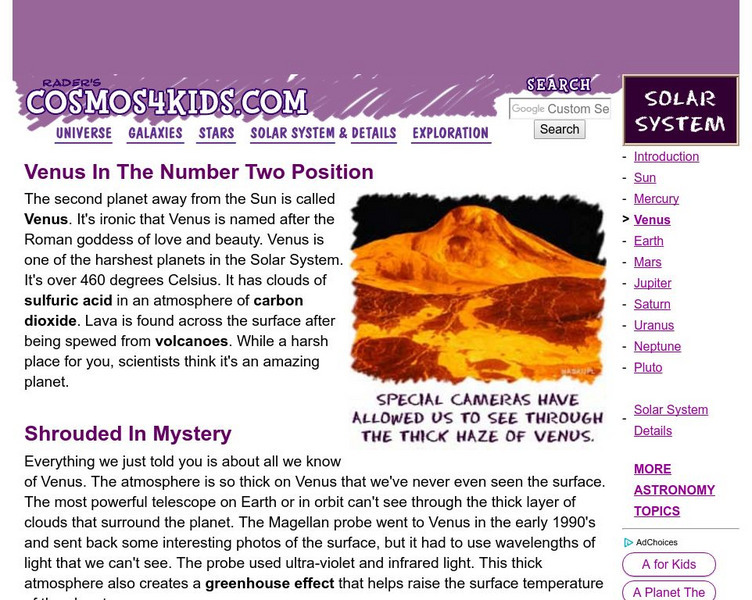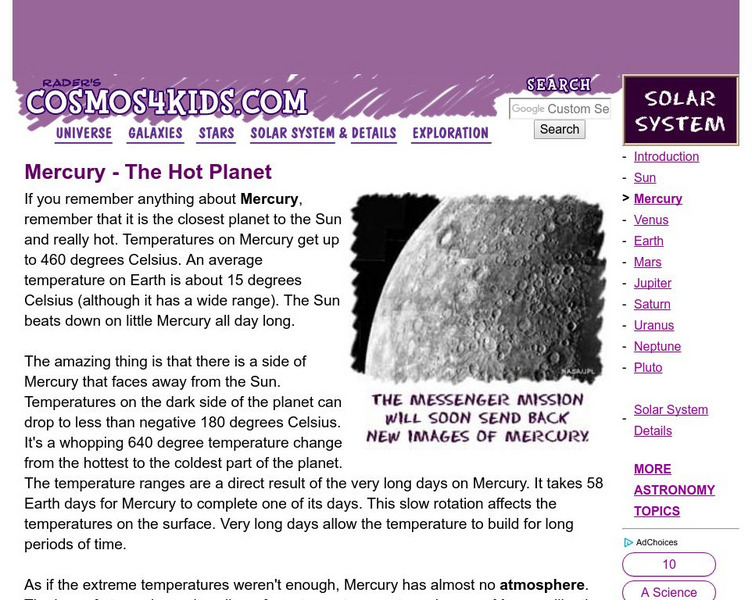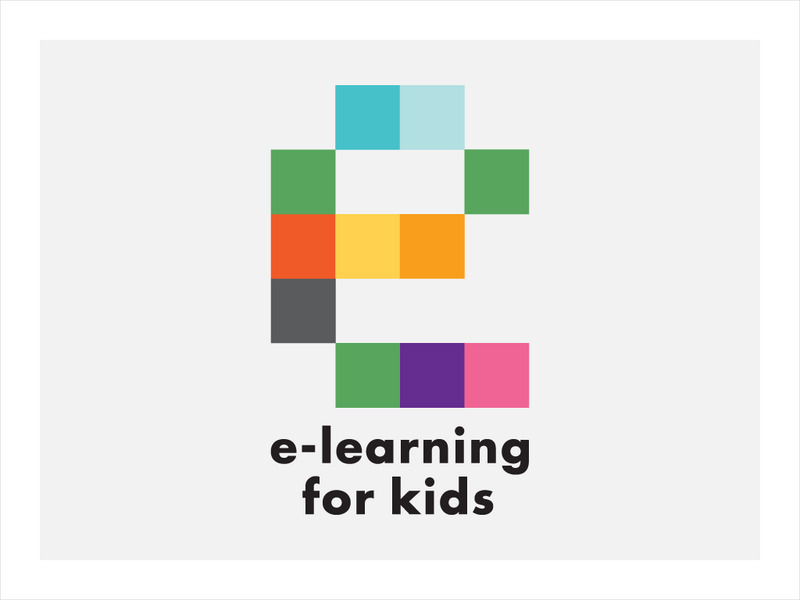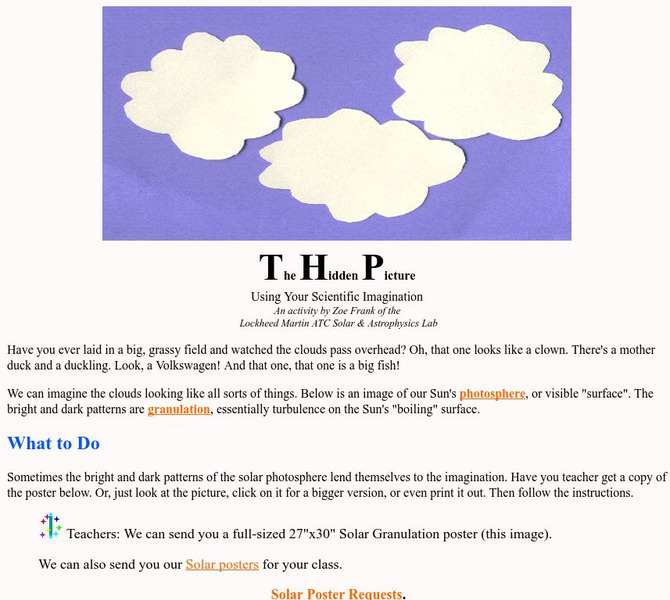BBC
Bb Ci Space: Solar System
Take a journey through the solar system with this interactive guide. Includes planetary history, "travel information," "tourist highlights," and video clips. Games and quizzes include a Solar System jigsaw that prompts the student to...
NASA
Nasa: Solar System Exploration
This stunning site on the solar system gives a great overview of the planets and our sun. Learn about each object's size, vital statistics, and moons. Then go on for a more in depth look at these objects in the column on the left.
Utah Education Network
Uen: How Big Are Earth, Sun, and Moon?
Understand where the sun is in the solar system and how big the earth, moon, and sun are.
NASA
Nasa: What Is a Planet?
This lesson teaches students about the characteristics of planets, comets, asteroids, and trans-Neptunian objects. After learning about these different things, students then are to debate about a new object that is found in space.
Utah Education Network
Uen: Themepark: Home/habitat: Planet Earth
Find a large collection of internet resources organized around our home planet, Earth. Links to places to go, people to see, things to do, teacher resources, and bibliographies.
Cosmos 4 kids
Cosmos4 kids.com: Solar System Details
This comprehensive site delves into other aspects of our solar system besides the planets and the sun. Click on the topics on the right like solar winds, the heliosphere, the heliopause, asteroids, comets, and more.
Cosmos 4 kids
Cosmos4 Kids: Solar System: Neptune
Learn the basic details about the planet Neptune! The brief, to the point text makes this site most suitable for younger researchers.
Cosmos 4 kids
Cosmos4 Kids: Solar System: Uranus
Learn all the basic facts about the planet Uranus. The brief, to the point text makes this site most suitable for younger researchers.
Cosmos 4 kids
Cosmos4 Kids: Solar System: Saturn
Learn the basic facts about the planet Saturn. The brief, to the point text makes this site most suitable for younger researchers.
Cosmos 4 kids
Cosmos4 Kids: Solar System: Jupiter
Learn all the basic facts about the planet Jupiter. The brief, to the point text makes this site most suitable for younger researchers.
Cosmos 4 kids
Cosmos4 Kids: Solar System: Mars
Learn the basic facts about the planet Mars. The brief, to the point text makes this site most suitable for younger researchers.
Cosmos 4 kids
Cosmos4 Kids: Solar System: Earth
Learn the basic facts about planet Earth, and its unique position as the only known planet where life can survive. The brief, to the point text makes this site most suitable for younger researchers.
Cosmos 4 kids
Cosmos4 Kids: Solar System: Venus
Learn the basic facts about the planet Venus. The brief, to the point text makes this site most suitable for younger researchers.
Cosmos 4 kids
Cosmos4 Kids: Solar System: Mercury
Learn all the basic facts about the planet Mercury. The brief, to the point text makes this site most suitable for younger researchers.
Cosmos 4 kids
Cosmos4 Kids: Solar System Details: Asteroids
Learn about asteroids. What are they? What is their structure? Difference between asteroids and comets? The brief, to the point text makes this site most suitable for the younger researcher.
Cosmos 4 kids
Cosmos4 Kids: Solar System Details: Comets
All about comets! What are they? How do they occur? What are their effects in the solar system? The brief, easy to understand text make this site most suitable for the younger researcher.
NASA
Nasa: Solar System Exploration: Planets
This impressive compilation of ideas is a great source for space science. Loaded with extra links for further information on the solar system.
Cosmos 4 kids
Cosmos4 Kids: Everything Gathers
Understand that smaller parts make up the larger parts of our solar system. See that gas and dust come together to form a star, small rocks and asteroids come together to form planets, and so on. This page is a reference page that...
Cosmos 4 kids
Cosmos4 Kids: Solar System: Pluto
Learn all about Pluto ..its discovery, basic facts, recognition as a planet, and most recently, its 'demotion' from a planet to a dwarf planet. The brief, to the point text makes this site most suitable for younger researchers.
E-learning for Kids
E Learning for Kids: Science: Madagascar: What Is the Solar System?
Patrick loves being a pirate, but he'd prefer to be an astronomer. Join him, and learn about everything high in the sky like the moon, stars, and asteroids.
Stanford University
The Hidden Picture
What can you see in the sun's granules? This site includes links and further information for teachers on how to teach convection.
American Museum of Natural History
American Museum of Natural History: Ology: Cosmic Cookies
Roll your mouse over the planets in our solar system to read a vignette about each. Then, link to the recipe for directions to create miniature planet cookies that look like the real thing.
Wolfram Research
Wolfram Science World: Copernicus, Nicolaus (1473 1543)
A biography of Nicolaus Copernicus and his contribution to science, specifically astronomy.
Nine Planets
The Eight Planets: Just for Kids
Here is a clear, simple picture of the solar system. Click on the names of the planets to learn more about each. Clicking on underlined terms takes you to more and more detailed scientific information.








